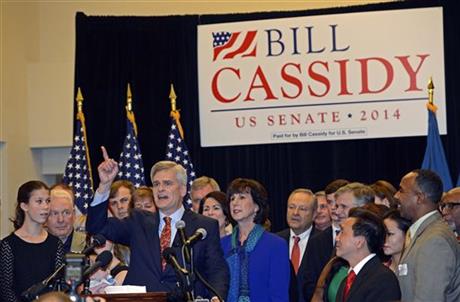
By MELINDA DESLATTE, BILL BARROW
Republican Rep. Bill Cassidy defeated Democratic Sen. Mary Landrieu on Saturday, denying her a fourth term and extending the GOP’s domination of the 2014 midterm elections that put Republicans in charge of Capitol Hill for the final two years of President Barack Obama’s tenure.
With Cassidy’s victory, Republicans will hold 54 seats when the Senate convenes in January, nine more than they have now. Republican victories in two Louisiana House districts Saturday — including the seat Cassidy now holds — ensure at least 246 seats, compared to 188 for Democrats, the largest GOP advantage since the Truman administration after World War II. An Arizona recount leaves one race still outstanding.
With nearly all the votes counted, unofficial returns showed Cassidy with a commanding victory.
Landrieu had narrowly led a Nov. 4 primary ballot that included eight candidates from all parties. But at 42 percent, she fell well below her marks in previous races and endured a one-month runoff campaign that Republicans dominated via the air waves while national Democrats financially abandoned her effort.
Landrieu’s defeat is a blow for one of Louisiana’s most famous political families, leaving her brother, New Orleans Mayor Mitch Landrieu, to carry the banner.
The GOP sweep also denied former Gov. Edwin Edwards a political comeback; the colorful 87-year-old politician, who had served four terms as governor in the past, sought a return to public office after eight years in federal prison on corruption charges.
In the South, Democrats will be left without a single governor or U.S. senator across nine states stretching from the Carolinas to Texas. The House delegations from the same region are divided almost entirely by race, with white Republicans representing majority-white districts, while majority non-white districts are represented by black or Hispanic Democrats.
Cassidy, who spent most of his campaign linking Landrieu to Obama, called his win “the exclamation point” on the message that voters sent nationally on Nov. 4.
“This victory happened because people in Louisiana voted for a government that serves us, that does not tell us what to do,” Cassidy said in a brief victory speech in Baton Rouge.
He did not mention Obama or offer any specifics about his agenda in the Senate, but said he believes voters have demanded “a conservative direction” on health care, budgets and energy policy. Cassidy did not take questions after his speech.
Speaking a half hour before in New Orleans, Landrieu struck an upbeat chord. “We may not have won tonight, but we have certainly won some extraordinary victories,” she told supporters, citing her role in directing additional oil and gas royalties to Louisiana and securing federal aid after multiple hurricanes and the 2010 Gulf Oil Spill.
“It’s been a fight worth waging,” she said. “Louisiana will always be worth fighting for.”
She also said she was “proud” of her efforts to expand health care access, though she didn’t specifically mention the Affordable Care Act.
The Louisiana race mirrored contests in other states Obama lost in 2014, with Landrieu, 59, joining Alaska Sen. Mark Begich, North Carolina Sen. Kay Hagan and Arkansas Sen. Mark Pryor in defeat. Democrats ceded seats in Montana, South Dakota and West Virginia after incumbents opted not to run again.
Like victorious Republicans in those races, Cassidy, 57, made his bid against Landrieu more about Obama than about his own vision for the job. An Illinois native, Cassidy made few public appearances during the runoff, seeking to avoid missteps that could change the race.
But in a state where 73 percent of white voters on Nov. 4 told pollsters they “strongly disapproved” of the president, that was enough to prevent Landrieu from finding her footing. Cassidy also enjoyed a prodigious advertising advantage in the runoff: Of every dollar spent by outside groups during the one-month runoff, 97 cents benefited the congressman.
Landrieu tried several messages over the course of her losing effort.
Most recently, she had hammered Cassidy as unfit for the job and more interested in partisanship than helping Louisiana. She directed her most pointed criticism at Cassidy’s medical teaching job in Louisiana State University’s hospital system. Calling Cassidy “Dr. Double Dip,” Landrieu suggested he collected a $20,000, taxpayer-funded salary for little or no work, describing gaps and discrepancies in Cassidy’s LSU timesheets. LSU said it’s looking into the timesheet questions.
She argued that the race shouldn’t be about Obama, but also targeted advertising on radio stations geared to the black community, where the president remains popular.
Her anchor argument was that her seniority was a boon for Louisiana, particularly her chairmanship of the Senate’s energy committee, an important panel for this oil-rich state. But that argument was gutted on Nov. 4 when Republicans won the Senate majority, meaning Landrieu would have lost her post even had she won.
____
Barrow reported from Atlanta. Plaisance reported from New Orleans



